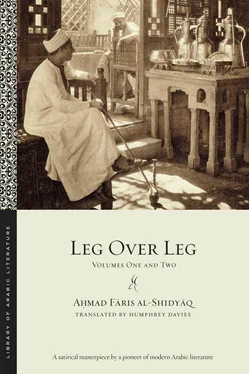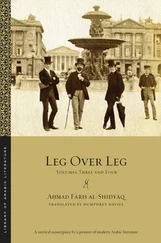2.18.3
After studying grammar in the manner mentioned, the Fāriyāq had a recurrence of eye pain. When he recovered, he decided to study Al-Talkhīṣ fī l-maʿānī ( The Epitome on Tropes ). 651He started on it with Shaykh Aḥmad but had not got far into it before he was struck by pruritis, which he failed to recognize at the onset, which explains why he went on studying. Once, as the shaykh embarked on the explanation of some complex issue, the Fāriyāq’s body started itching all over, so he started scratching with both hands. The shaykh turned and, seeing him absorbed in scratching, asked him, “Why are you scratching and, as far as I can see, paying no attention to the ‘if-it-be-saids’ and the ‘answer-may-be-mades’? Are we here to scratch limbs or words?” “Please forgive me,” replied the Fāriyāq, “but the relief provided by scratching distracts me from everything else.” “You have pruritis?” the other asked. “It may be so,” he replied. The shaykh looked at his hands and said, “It is, by God. You must keep to your house and smear your body with dogs’ feces, for that is the only treatment.” So the Fāriyāq stayed at home and took to smearing his body every day with the aforementioned dogs’ feces and sitting in the sun for hours, until he found relief from that torment. Then, when he was cured, he returned to his studies.
2.18.4
After he finished going through that book, he suffered another attack of ophthalmia. Then he conceived the notion of studying al-Akhḍarī’s Sharḥ al-Sullam ( The Commentary on the Ladder ) 652on logic, so he started reading it under the direction of Shaykh Maḥmūd and was struck down by the hayḍah , which is the disease Egyptians call “the yellow air,” 653and spent three days oblivious to everything going on around him and incapable of uttering a sound, except that once his servant heard him raving about “the greater affirmative universal” 654and, thinking he was complaining of the severity of his state, replied that it was indeed “one of the greaters.” No one else had then contracted the disease in Egypt but by the time thirty days had passed it had spread throughout the country and become a general affliction, God save us, with thousands dying of it every day.
2.18.5
At this point, the Fāriyāq realized that he had been, to use the language of the logicians, the first term in this disaster, the others the second, and that it was the worms from which he suffered that had expedited his early subjection to this illness. Because of them, then, he moved quickly too and took — the Fāriyāq, that is — to mounting his donkey and touring the markets as though Fate could no longer touch him (note: this wasn’t the donkey that merited an elegy and a funeral oration; this one, being still alive, merited a eulogy), and went to a village in the countryside, accompanied by his male and female servant. A local governor, hearing of his presence, summoned him and his servants, the male and the female, and said to him, “Hey, wise guy! Is this a time for dying or a time for knocking people up? What are you doing bringing a girl like this here?” He replied, “I am the prince’s panegyrist, and I have come to let my eyes wander over the greenery of the countryside so I can praise it well, after the death of so many, for I have grown tired of the city and was afraid my creative powers would dry up.” “So who’s she?” he then said, pointing to the girl servant. “His sister,” said the Fāriyāq, indicating the male servant. “And who’s he?” he said. “His keeper,” he replied, indicating the donkey. The emir turned to the male servant and, finding him comely, said, “Since you’re the prince’s poet, or his poetaster, you cannot be sanctioned. But you will have to leave this servant with me, for he has the right qualifications to enter my service.” “You’re the boss,” said the Fāriyāq. “Take him!” That night the emir, having had his way with the boy, asked him insistently about the Fāriyāq and the servant told him, “Honestly, my lord, he’s a good man, but I think he may not be an Arab because I can hardly understand him when he speaks to me in our language.”
2.18.6
When morning came, the Fāriyāq made his preparations for the return journey but couldn’t find the donkey, so he decided he must have run off to join the first. He went looking for him and found that he’d gone off with another of the emir’s donkeys to an empty patch of ground, where he was bellowing and snorting beneath him. When the Fāriyāq saw him taking the passive role, he couldn’t contain his laughter and said, “It says in the hadith, ‘People follow the religion of their kings’ but no one ever said donkeys should follow the sect of their owners. Anyway, better the ass’s ass than the ass’s lender’s ass!” Then he returned to the house, where he found his serving boy and girl waiting for him. The boy told him, “The emir has released me from his service, because he found my qualifications were good for one night only, so now I’m free.”
2.18.7
Then the Fāriyāq, after having paid his respects to the emir and wished him good health, returned to Cairo, where the affliction had died down. He asked after his logic teacher and was told that he was alive and not numbered among the dead, 655so he went back to him and completed with him what he’d started. When he reached the last step on the Ladder , he suffered another attack of ophthalmia and stayed at home. When he recovered, he decided to learn something of jurisprudence and the science of theology, so he started on the Kanz ( The Treasure ) 656and the Risālah al-Sanūsiyyah ( The Senoussi Treatise ) 657and fell ill. A French acquaintance asked why he was so weak, and he told him the story. “I shall cure you,” the other said, “God willing, but on condition you teach my son Arabic.” “With the greatest of pleasure,” he returned, and immediately he started teaching him and taking the medication from his father. This, however, will have to be set out in detail in another chapter, on its own.
CHAPTER 19: THE CIRCLE OF THE UNIVERSE AND THE CENTER OF THIS BOOK
658
2.19.1
This man was a famous doctor in Egypt, but his reputation for causing decease was greater than that for curing it, the reason being that, at an advanced age, he’d married a fresh young girl and fathered on her a daughter and a son. Thereafter he’d ceased to be able to give her her marital rights, so he made it his habit to humor her and flatter her, which is how men usually treat their wives in such cases — falling short of pleasing and satisfying her in this area, he increases his attentions, his demonstrations of affection, and his loving treatment of her, imagining that these will make up in the woman’s eyes for the other, and he does the same when he’s unfaithful to her and falls in love with another. Likewise, the wife likewise usually increases her demonstrations of love and passion for her husband by giving herself to him to the point that he becomes sated with her and his cup runs over, or she flatters him, if it’s she who’s being unfaithful.
2.19.2
In keeping with this logic, the doctor told his wife one day, “Good woman, I observe that my key has become too rusty for use in your lock and that your age and blooming good health require you find yourself a copulative instrument to amuse yourself with until my time is done and you marry another. If you don’t, I’m afraid you’ll come to hate me and fly away and leave me as does the dove. It would be easier for me to lose one part of you than to lose you altogether, for you are the mother of my children and the closest thing to my heart, and I could not bear to be separated from you. Choose whomever you’d like and I’ll drag him to you by his horns.” (The woman laughed at this.) Then he added, “And given that I am well known in this town to be a doctor, if the neighbors see a man, or even men, coming to me no one will suspect you” (the woman laughed too at his mention of “men”) “for people knock on a doctor’s door at night — even at midnight” (and here she laughed again). Having talked to her at length in this vein, he ended by saying, “Don’t think that I’m the only one who practices this custom. In my country, people like me do the same” (at which, she let out a great whoop of laughter).
Читать дальше












